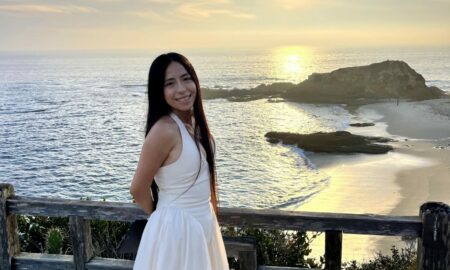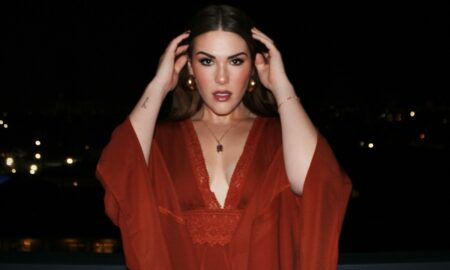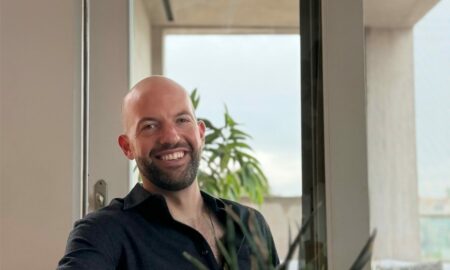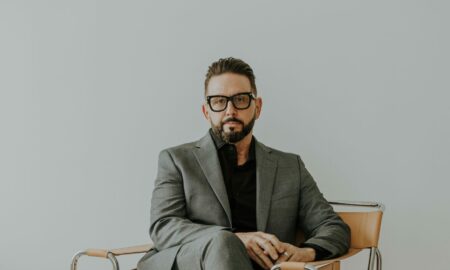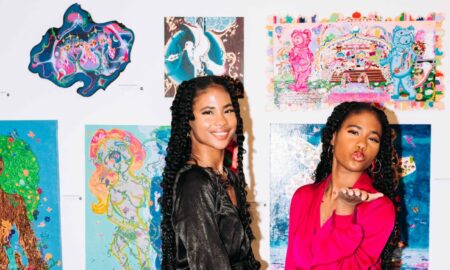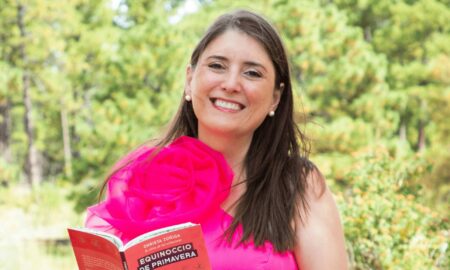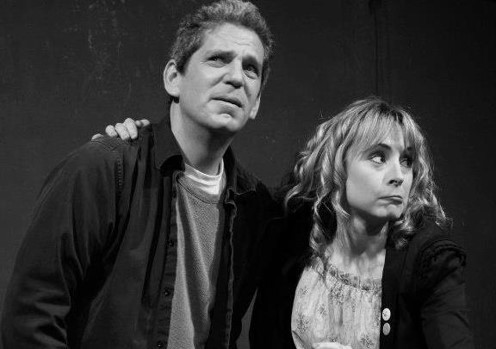

Today we’d like to introduce you to Miles Stroth.
Miles, let’s start with your story. We’d love to hear how you got started and how the journey has been so far.
It all began when I took my first improv class at the Players Workshop in Chicago in the summer of 1987. I was fascinated by the art form and excited to learn how to do it, but I had no idea at the time that it would change my life on the monumental level it has.
A few months after I started I got taken out by a hit and run driver, both shins shattered, and I was laid up for about a year but was determined to continue learning. In fact, when I auditioned for the Second City Training Center, I was still wearing protective leg braces. After Second City I moved on to what was then ImprovOlympic, where I studied long-form improv under Del Close, the legend himself. It was there that my imagination and skills caught fire.
Longform improv had so much more potential for exploring deeper themes and ideas and gave us the ability to tell complete stories. It required more than being funny; you had to be funny and also truthful and real. That was when I became part of the seminal team The Family. We changed the way long-form was seen, broke the Harold – the signature form Del created with Charna Halpern – and invented new forms like the Deconstruction that continue to play at theatres around the world.
It was from the work that The Family did with Del that UCB was born (few people realize how interrelated the major improv programs and schools are). I started teaching improv in 1993, after opening the ImprovOlympic on Clark street with Del and Charna and running the whole place for the first two years. Again… little did I know. I did my last show in Chicago – Zumpf with Dan Bakkedahl – and moved to Los Angeles in 2001.
I didn’t do it for creative reasons, or career ambitions, I was chasing a girl, and I got her, nothing will ever top this achievement, nothing will ever give my life more meaning, or make me feel more fulfilled and complete, than my wife and our kids. In LA, I continued to teach and perform improv at iO West, but I grew disenchanted with the way various training programs approached the art form. Too much structure, not enough freedom to explore and develop new ideas, and too much focus on trying to force nascent performers into predetermined boxes, instead of looking at them as individuals with something to say and bending the art form to fit them.
So in 2007, the Miles Stroth Workshop was born. While I certainly had a ton of experience on both the artistic and practical levels, and from teaching for many years. MSW was the first time I really stepped out on my own, and that’s a scary thing for anyone to do. But I believed in myself and in my perspective on improv as an art form and how to teach it, perform it, and inspire people to break the norms and evolve it. So I signed up my first four students and got to work.
Soon four students became six, and then word of mouth took off. Eventually, MSW became three workshops and two levels, all taught by me. It was growing, and I realized I was building something that was becoming bigger than me. Students I trained wanted to perform and show off what they learned. I brought on additional instructors, like Heather Anne Campbell and Eric Moneypenny, expanding the curriculum to include writing and sketch comedy. Heather and I as a duo then did what turned into a 50 show run at UCB, and the popularity of our classes exploded.
MSW continued to grow, incrementally adding more performance nights at The Complex in Hollywood. In 2015, we had built something. What started as the Miles Stroth Workshop had grown into a full training program for improvisers, writers and sketch comedians with several teachers, hundreds of alumni and students putting up shows several nights a week. A vibrant community of artists formed around us. It was bigger than me.
Sure, it was established by me, funded by me, and was based on my philosophies about improv as an art form, and what I think performers need to know. But it was now more than the Miles Stroth Workshop. It was a community of hungry, ballsy artists. It was a Pack. I never saw any of this coming, but it’s here now, and nothing short of amazing.
The level of pride I have for what we’ve built and continue to grow is hard to describe because I don’t see myself as a legend, or this revolutionary leader who bucked the system and flipped a 40-year-old art form on its ear. I’m just an old man that loves to teach my classes. I love providing a safe space for people to try new things and grow as artists, and to elevate themselves. To me the best part of my job, the reason why I do it, is for that moment in a class where you’re able to reach someone.
I may be the founder of the Pack, and I suppose the inspiration for it, but it’s the people who inspire me, like the Pack’s Artistic Director Elyssa Philips, who deserve the credit for making our theater what it is. She just staggers me with her dedication, energy, and belief in what we’re doing. She guides the ship through waters that frequently shift between exciting as hell and thankless misery. I may be the figurehead of the Pack, but it’s the people like Elyssa who are the heroes.
We’re always bombarded by how great it is to pursue your passion, etc. – but we’ve spoken with enough people to know that it’s not always easy. Overall, would you say things have been easy for you?
Someone recently asked me if I could start over again what I would do differently. I said “Everything. Since 1994.” I’m not the first person in their 50s to say something like that, and I won’t be the last. There are always lessons to be learned when managing growth.
I think any small business owner will tell you that, and the Pack is no exception. We started small and built slowly, and in retrospect should have stuck to that path rather than jumping to shows seven nights a week when we did. The numbers said we could do it, and I invested everything I had from MSW and went all in because I believed in what we were doing.
But now that we’re a few years in I realize that we’d be in a stronger position now if we’d made that transition more gradually. Of course the elephant in the room, at least as far as lessons go, is that there’s a mantra in my house, often repeated by my children: “Never open a theater.”
It is very hard work, and exhausting work, to start and run a theater and school. It’s more than a full-time job, and one that results in very little – if any – income. There is an enormous amount of minutia involved, and because it involves art and artists, most of it sits in a minefield fraught with emotion, insecurity, ego, and entitlement. Add to that the time, focus, and spiritual investment you have to put into teaching…
I now have the office job I was trying to avoid when I first signed up for classes. I no longer perform. I don’t see as many shows as I’d like, and certainly not as many as people demand that I should, because I have a family I will never see otherwise. Being in the position I’m in, you will never take a vacation, you can barely take a nap, and everything you do to keep the doors open and lights on will be countered by people saying you’re not doing enough. It’s disenchanting, and not a role that should be taken up by the faint of heart.
I think the gravity of that is lost on a lot of people, and its underestimated by those of us who wade into those waters. Theaters are unique among most businesses because communities form around them, and as cool and awesome and mind-blowing as that can be, there’s a heavy price that comes with it. Not just the literal (and significant) cost of running the establishment itself, but because of the inevitable, stupid divides that occur within communities everywhere.
Back in my early years, when I ran iO in Chicago, some of the best to have ever played the game made a point to hang out almost every night with whoever was new and make them feel welcome. Hell, when I started, and I absolutely sucked at improv, my heroes would invite me to hang out with them. I was a Level 1 student, and Pat Finn invited me to his bachelor party. It was insane and so incredibly generous and kind. Having that kind of community around me had a dramatic effect not only on my development as an artist but as a person.
Over time artistic communities have grown bigger, but not better. I wish I could will that sort of love, the camaraderie that comes from simply sharing a common passion, back into existence. I wish I could instill the kind of confidence and spirit required to drop your ego, listen to other voices, and not feel entitled to things you haven’t earned. I wish I could inspire people to just be cool to the people around you, and not be assholes. But, ironically, in this age of information and connection, people have become more isolated and self-absorbed.
That doesn’t mean I won’t stop trying. The first time someone asked me, “Why do you improvise, what’s the goal?” My answer was the same as it is today. “To heal the world.”
The world has changed. My goal has not.
We’d love to hear more about your business.
The Pack Theater is both a live comedy theater and a school. We have performances seven nights a week running the gamut from improv, sketch, stand-up, variety shows, and all of our regular performers have trained with us. All of our shows are Pay What You Can, either by filling the cash jar or Venmo to pack-theater.
We pride ourselves on originality; if you’re seeing a Pack Theater show, it’s going to be unique. Our training program offers top-notch instruction in improvisation, sketch writing, and a wide range of electives. Our classes are safe, inclusive environments where students are encouraged to take risks and to discover and unlock their unique comedic voices. Our teachers challenge each student to be bold, weird, and above all, original.
We are proud that our students have said there is no other place in comedy where everyone cares more about what they do. Pack teachers are experienced actors, writers, directors, and producers. They have performed across the country, and each holds years of experience teaching comedy. Their credits include Saturday Night Live, Whose Line Is It Anyway?, Fox ADHD, Reno 911!, The Eric Andre Show, HBO’s Shameless, The Midnight Show, The Whitest Kids U’Know, and Key & Peele.
LA has a large and vibrant comedy community, and I’m really inspired by the other theaters in town. We all know each other, love each other, respect each other, and the more diverse voices a community has, the stronger it is. What we offer at the Pack, what makes us different and significant and vital largely comes down to the fact that we do, what we teach, you can’t find anywhere else.
There’s a reason why tremendously talented and passionate artists seem to gravitate toward us, it’s just difficult to define a vibe, and the feelings you get when you realize that the weirdo comedian you’ve always been has this many kindred spirits.
Contact Info:
- Address: 6470 Santa Monica Blvd., Hollywood CA
- Website: packtheater.com



Image Credit:
Joe White
Getting in touch: VoyageLA is built on recommendations from the community; it’s how we uncover hidden gems, so if you know someone who deserves recognition please let us know here.












